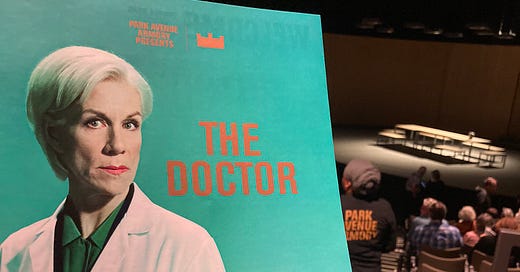This British Play Honestly Examines Pride In The Field Of Medicine
'The Doctor' is a must-see for those in the NYC area.
On August 10, 2019, The Doctor premiered at the 325-seat Almeida Theatre in London. An adaptation of the 1912 play Professor Bernhardi, this rendition gives it the modern update needed to connect with today’s audiences. The production received rave reviews and landed lead actress Juliet Stevenson the Critics’ Circle Theatre Award. Robert Icke, the playwright, took home the Evening Standard Award for Best Director.
The production was set to transfer to the West End in April 2020, but that didn’t happen due to COVID. While on hiatus in the name of public health, The Doctor would ironically become one of the most relevant theatre pieces of the 21st century. Eventually, the show would make it to the West End in 2022 before crossing the pond to the stunning Park Avenue Armory in NYC where it began previews on the 3rd of this month. It officially opens Tuesday.
The show begins with two doctors discussing the outcome of a patient whose deterioration, they had determined, was linked to either the liver or kidneys. Due to the patient’s fragile state and expiring timeclock, the doctors decided they weren’t able to do sufficient testing. Their only option was to guess at which organ to target, but consensus was not reached. They ended up going with the wrong organ and the patient died. This immediately created a high-stakes, high-pressure, life-or-death environment on stage.
The action kicks off when central character Dr. Ruth Wolff, Founding Director of the Elizabeth Institute, refuses to let a Catholic priest into the room where a teenaged girl is dying of sepsis from a botched self-administered abortion. It was quite evident to me that this New York-area audience immediately felt bad for the dying off-stage character and sided with the doctor who believed that, had the girl not come from a family with strict Catholic parents, she would have been able to get a safe abortion. Behind me, I heard a woman mutter, “Ugh. Call security.”
In what was likely a twist of expectation for many, the doctor escalated the situation. In a desperate attempt to read last rites, the priest boldly moved towards the room. A clever theatrical trick was used to suggest that Dr. Wolff put her hands on the priest—the extent of which would later be up for debate by parties both participating in and witnessing the altercation.
This one incident would set off inner turmoil within the hospital for the rest of the first act. What might have been resolved with a simple statement and apology would become a PR nightmare when Dr. Wolff insisted on standing her ground. Throughout the play, her pride would clash with faith, wokeness and even family. The metaphor of the “lone wolf” or even the “wolf in sheep’s clothing (white coat)” resonated.
This British production gave us an authentic look into this world—something we don’t see in mostly hyper-partisan American productions that tend to preach to the choir without really challenging their audience.
A prime example of a problematic American production was Kristina Wong, Sweatshop Overlord, a self-congratulatory one-woman show in which a woman obsesses over being a COVID savior by making cloth masks in 2020. Although there are a handful of moments where the playwright is self-deprecating and reflects on her mistakes, the play aged quite poorly when it opened in October 2021 as people were coming out of the fog of the so-called “pandemic.”
With a whole plot inspired by fear propaganda, Kristina Wong preached to her choir of monkey-see-monkey-do acolytes who fear cancellation above all. Disguised as a battle between humanity and nature, Kristina Wong, Sweatshop Overlord was little more than a virtue signaling blame game. If you’re wondering if the COVID injectable products that she knows nothing about were brought up, the answer is yes. She even split the audience into what was essentially “good obedient liberals” and “bad resistant conservatives” in a sad attempt at making a point. Yikes.
Towards the end of The Doctor, the priest and Dr. Wolff reunite for a civil and genuine conversation. The priest makes a good point that, although she is a doctor, she is also human. Dr. Wolff admits she mostly sees herself as a doctor.
Can one be a good doctor without being human first and foremost? Where does this soul-sucking arrogance come from that we see in the profession? History? A pedestal the white coat has been placed upon? The universities and institutions? The pressures of the job? The non-stop propaganda machine?
In the final moments, when Dr. Wolff is questioned one last time, she delivered one of the most striking lines in the play:
DR. RUTH WOLFF: Yes. I’m crystal clear. I’m a doctor.
The North American premier of The Doctor runs through August 19th at the Park Avenue Armory in NYC.







This is the fear I have of doctors. They have proven how co-opted. They will do anthing in the name of medicine. Who are we to question the Dr.! Its just like theater too, also co-opted and pushing propaganda always. Great story!
“Can one be a good doctor without being human first and foremost?” -- i taught 2nd year med students how talk to pts (social etiquette basically). the very bestm human, “becoming-doctors” from my standpoint were students who returned to school for their MD after doing nursing for a few years. no comparison w/kids who were just book-smart and chose btwn law school and med school.